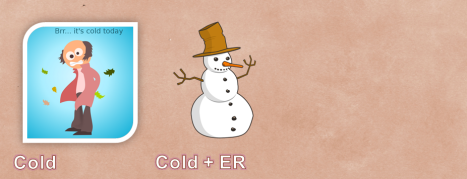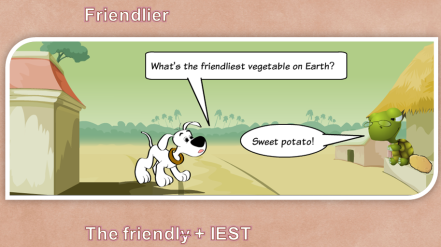| In this post we will learn comparative and superlative degrees of adjectives. |
And before we start let’s meet Josh. He is very young. He is only three years old. |
Josh has a baby sister who is even smaller. Her name is Betty and she is only 11 months old. She is almost 2 years younger than Josh. |
Betty and Josh have a baby cousin. Her name is Lina and she is only 1 month old. She is the youngest of all.
   
When we compare two things we add ER to the adjective. |
When we want to describe something that has the highest degree of a quality among three or more things, we use the superlative degree. |
Try to do this one. Can you form a comparative and superlative degree of COLD? |
 |
 |
 |
| Easy, isn’t it? |
So what would be the comparative degree of smart?
 |

Can you form the superlative? |
 |
When an adjective is short, we add ER and the EST to it, but do we do the same if an adjective is long? Can we say “comfortabler”? What a mouthful! It is too hard to say. That’s why if an adjective has two or more syllables, don’t use ER and EST. |
We use MORE + adj to compare two things. |
And THE MOST + adj in the superlative degree. |
Can you form the comparative degree of difficult? |
More difficult! And the superlative degree is “the most difficult”. Easy, isn’t it? |
And how about famous? This word has two syllables: “Fa-mous”. The majority of two syllable words form their comparative and superlative degrees with more and the most. So what is the comparative degree of Famous?
 |
More famous! Can you form the superlative as well?
Of course, it is the most famous!
 |
| So when we want to compare 2 things, we use the comparative degree of adjectives.When we have 3 or more things and we want to highlight one particular thing in this group which has the highest degree of a certain characteristic, we use the superlative degree.If an adjective is short and has only one syllable, we add ER to the adjective in the comparative form and the EST in the superlative. Some two-syllable adjectives also form comparatives and superlatives with ER and EST. However, if the word is long and has two or more syllables, we add MORE in front of the adjective in the comparative and THE MOST in the superlative degree. We can also use LESS and THE LEAST. They are the opposites of more and the most. |
 |
Now some adjectives can be tricky when it comes to spelling.For example, try to form the comparative and the superlative degree of BIG. Since it is a very short one-syllable word we will use ER and the EST.
 |
And we will get BIGGER. But notice that the final G is doubled. This always happens when the word ends in a Consonant – vowel – consonant sequence (CVC adjectives). We double the final consonant in order to keep the pronunciation. |
| Now can you form the superlative form? |
The BIGGEST. We will need to double the G once again. |
Now try this one. Once again it is a short one-syllable word and we need to add ER and the EST, but like in the previous example here we have a consonant followed by a vowel and another consonant.
 |
So we need to double the T and we will get WETTER. And what will be the superlative degree? |
The WETTEST with double T once again. |
CVC adjectives are not the only adjectives with a little bit tricky spelling in comparative and superlative degrees.For example, take a look at EASY. It is also a short adjective that forms its comparative and superlative forms with ER and the EST. Can you notice the pattern?
What has changed in the comparative degree? The “Y” has changed to “I”. Can you form the superlative degree? How will you spell it? |

It will be “THE EASIEST” with an “I” instead of the “Y”. |
| What about friendly? What are its comparative and superlative degrees?It is one of those two-syllable adjectives that form comparative degrees with ER and the EST but be careful with spelling. |
 |
One-syllable and some two-syllable adjectives ending in “E” add only “-R” or “-ST”.For example, look at “SAFE”. Can you form the superlative degree? |
It will be “THE SAFEST” with only one “E”. |
So, remember that one-syllable and some two-syllable adjectives ending in “E” add only “-R” or the “-ST” in the comparative and in the superlative.Adjectives ending in “Y” drop “Y” and add “I” before -ER and the -EST.CVC-adjectives double the final consonant. |
There are also several adjectives that form their comparative degrees differently. You need to memorize these forms.For example, “GOOD” in its comparative form becomes “BETTER”. |
And in the superlative it is “THE BEST”. |
“BAD” also changes differently in the comparative and in the superlative degree. Do you know its forms?

In the comparative form it becomes “WORSE”. 
And in the superlative it becomes “THE WORST”. “FAR” also has irregular comparative and superlative forms. There are several more adjectives in this group. For now try to remember these three irregular forms and we will learn more as we go.                 
This is also available as a grammar slideshow from Slideshare. Please, like, comment and share if you enjoyed this post, so that I can create more of what you like and find of use. Smiles 🙂 |





















































Hi Alina, thanks for following me! I love how you have presented this info – and would like to use it in my classroom – is that okay? I found a little typo in the text near the beginning of this post. When I make little mistakes I would want people to tell me. The excerpt is below – you have typed “is” instead of “if”. I thought you might want to edit it.
I’m so glad you started following me and I can’t wait to see more of your resources and ideas.
Mel =)
When an adjective is short, we add ER and the EST to it, but do we do the same if an adjective is long? Can we say “comfortabler”? What a mouthful! It is too hard to say. That’s why IS an adjective has two or more syllables, don’t use ER and EST.
LikeLiked by 1 person
Thank you so much, Mel!
I really appreciate your words and you mentioning the error that has creeped into the post.
I absolutely love what you are sharing on your blog! You are a treasure trove of creativity and smart ideas. So glad I stumbled on your blog.
Please, feel free to use whatever material is posted on my blog, it is a real pleasure if you do.
Thank you once again!
Smiles,
Alina
LikeLike
LOVED IT! Your blog is included as part of the 41st ELT Blog Carnival! Be sure to see the other posts mentioned here: http://eslcarissa.blogspot.com/2014/08/41st-elt-blog-carnival-teaching-with.html
LikeLiked by 1 person
Thank you so much and thank you for holding the 41st ELT Blog Carnival! You are so brilliant and admirable!
LikeLike
Thanks indeed for your great work!!! You saved me. I needed smth different for an open lesson, and this is IT!!!
LikeLike
Pingback: Grammar with comics and jokes: Comparative and ...
Pingback: Grammar with comics and jokes: Comparative and ...